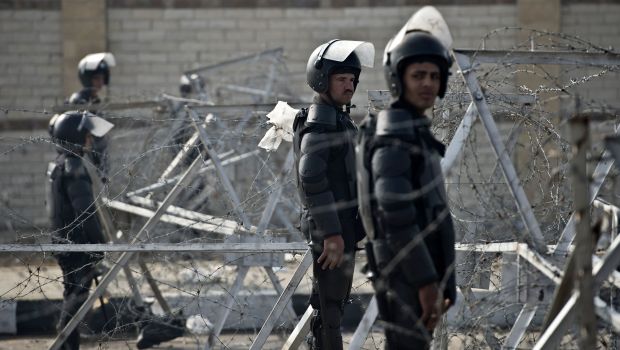
Egyptian riot policemen stand guard behind barbed wire outside the Police Academy where a hearing in the espionage trial of Egypt’s ousted Islamist president Mohamed Mursi is expected to open on February 16, 2014 in Cairo. (AFP Photo/Khaled Desouki)
Cairo, Asharq Al-Awsat—Former Egypt President Mohamed Mursi’s trial on charges of espionage and “conspiracy to commit acts of terror” has been adjourned after his defense team withdrew from the hearing on Sunday.
Lawyer for the defense, Mohamed Salim Al-Awa, objected to the soundproof glass cage inside which Mursi was kept, complaining he was not able to communicate with his client.
He then withdrew from the courtroom, leading the presiding judge, Shaaban El-Shamy to order a recess until further notice.
The soundproof cage was introduced after Mursi interrupted previous hearings, addressing the judge while the latter was talking, and shouting that the trial was “illegitimate.”
Although the cage is fitted with microphones enabling the defendant inside to be heard in the courtroom, the presiding judge has complete control of these and is able to turn the sound on and off as he wishes.
Mursi is accused of collaborating with foreign organizations, including Hamas and Hezbollah, disclosing state secrets, and “coordinating with jihadist organizations inside and outside Egypt to plan terrorist acts on Egyptian territory,” as well as planning to “commit acts threatening the independence of the country, its unity and the security of its territory.”
Leading figures from the Muslim Brotherhood are also on trial alongside Mursi, including the Supreme Guide of the Muslim Brotherhood, Mohammed Badie, and his two deputies, Khairat El-Shater and Mahmoud Izzat, who remains at large.
Investigations carried out by Egypt’s State Security claim “the international organization of the Muslim Brotherhood carried out terrorist acts inside Egypt and planned alliances between the Muslim Brotherhood in Egypt, and the Palestinian Hamas movement and the Lebanese Hezbollah, as well as other organizations inside and outside the country, in order to take control of security installations in Sinai.”
If convicted, the defendants, which total 36 people, could face the death penalty.
Mursi is also on trial on four other charges, including insulting the judiciary, escaping from prison during mass jailbreaks following Egypt’s 2011 uprising, and “inciting his supporters to commit crimes of deliberate and premeditated murder, the use of violence and intimidation and the arrest of peaceful protesters, unlawfully detaining them and torturing them.”
Since deposing Mursi last July following widespread protests, the military-backed interim government has cracked down heavily on the Muslim Brotherhood organization to which Mursi belongs.
In December the group was outlawed as a terrorist organization by the authorities following a spate of bomb attacks and assassinations across Egypt targeting security forces.
